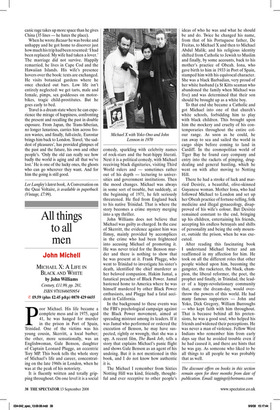All things to all men
John Michell
MICHAEL X: A LIFE IN BLACK AND WHITE by John Williams Century, £11.99, pp. 281, ISBN 9781846050954 ✆ £9.59 (plus £2.45 p&p) 0870 429 6655 Poor Michael. His life became a complete mess and in 1975, aged 41, he was hanged for murder in the prison in Port of Spain, Trinidad. One of the victims was his young cousin, Skerritt, a local barber; the other, more sensationally, was an Englishwoman, Gale Benson, daughter of Captain Leonard Plugge, an eccentric Tory MP. This book tells the whole story of Michael’s life and career, concentrating on the late 1960s in London, when he was at the peak of his notoriety.
It is fluently written and totally gripping throughout. On one level it is a social comedy, sparkling with celebrity names of rock-stars and the beat-hippy literati. Next it is a political comedy, with Michael receiving black dignitaries, visiting Third World rulers and — sometimes rather out of his depth — lecturing to universities and government institutions. Then the mood changes. Michael was always in some sort of trouble, but suddenly, at the beginning of 1971, he felt seriously threatened. He fled from England back to his native Trinidad. That is where the story becomes a crime mystery merging into a spy thriller.
John Williams does not believe that Michael was guilty as charged. In the case of Skerritt, the evidence against him was flimsy, mainly provided by accomplices in the crime who had been frightened into accusing Michael of promoting it. He was never tried for the Benson murder and there is nothing to show that he was present at it. Frank Plugge, who went to Trinidad to investigate his sister’s death, identified the chief murderer as her beloved companion, Hakim Jamal, a fanatical preacher of Black Power. Jamal hastened home to America where he was himself murdered by other Black Power enthusiasts, and Plugge had a fatal accident in California.
In the background to these events was the FBI’s psychological campaign against the Black Power movement, aimed at spreading mistrust among its leaders. If it was Jamal who performed or ordered the execution of Benson, he may have suspected, rightly or wrongly, that she was a spy. A recent film, The Bank Job, tells a story that explains Michael’s panic flight and shows Gale Benson as an agent of his undoing. But it is not mentioned in this book, and I do not know how authentic it is.
The Michael I remember from Sixties Notting Hill was kind, friendly, thoughtful and ever receptive to other people’s ideas of who he was and what he should be and do. Twice he changed his name, from that of his Portuguese father, De Freitas, to Michael X and then to Michael Abdul Malik; and his religious identity shifted from Catholic to Jewish to Muslim and finally, by some accounts, back to his mother’s practice of Obeah. Iona, who gave birth to him in 1933 in Port of Spain, stamped him with his equivocal character. She was a black Barbadian, very proud of her white husband (a St Kitts seaman who abandoned the family when Michael was five) and was determined that their son should be brought up as a white boy.
To that end she became a Catholic and got Michael into one of that church’s white schools, forbidding him to play with black children. This brought upon him the mockery and cruelty of his contemporaries throughout the entire colour range. As soon as he could, he ran away to sea and sailed the world in cargo ships before coming to land in Cardiff. In the cosmopolitan world of Tiger Bay he found easy company and entry into the rackets of pimping, drugdealing and general hustling, which he went on with after moving to Notting Hill.
There he had a stroke of luck and married Desirée, a beautiful, olive-skinned Guyanese woman. Mother Iona, who had followed Michael to London and set up her Obeah practice of fortune-telling, folk medicine and illegal gynaecology, disapproved of his wife’s colour. But Desirée remained constant to the end, bringing up his children, entertaining his friends, accepting his endless betrayals and shifts of personality and being the only mourner, outside the prison, when he was executed.
After reading this fascinating book I understand Michael better and am reaffirmed in my affection for him. He took on all the different roles that other people wished upon him, becoming the gangster, the racketeer, the black, champion, the liberal reformer, the poet, the prophet and finally, in Trinidad, the leader of a hippy-revolutionary community that, come the dream-day, would overthrow the powers of this world. He had many famous supporters — John and Yoko, Dick Gregory, William Burroughs — who kept faith with him throughout. That is because behind all his pretensions, he was a good soul, who helped his friends and widened their perceptions. He was never a man of violence. Fellow West Indians who remember him from early days say that he avoided trouble even if he had caused it, and there are hints that he was gay. As someone who liked to be all things to all people he was probably that as well.










































































 Previous page
Previous page